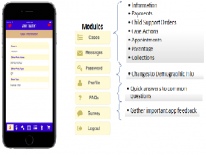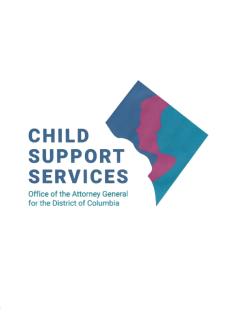How Parentage Is Established -- Generally
Establishing parentage is a critical first step in the child support process, and it has other important benefits for a child and for that child's parents. Below are the ways parentage may be established.
The Paths to Parentage
Automatic Legal Relationship
If a child is born to parents who are married or in a registered domestic partnership, there is an automatic legal relationship between the mother's spouse/domestic partner and the child. The name of the spouse/domestic partner will be placed on the child's birth certificate. The mother's spouse/domestic partner is presumed to be the child's parent by virtue of the legal union.
In the District of Columbia, when a child is born to unmarried parents or parents who are not in a domestic partnership, there is no automatic legal relationship between the father/other adult and the child. However, there are two other ways to establish parentage for the child.
Acknowledgment of Paternity (AOP)
Parentage can be established for a child if a mother and father voluntarily sign an Acknowledgement of Paternity. This method of resolving parentage is available if the mother was not married or in a registered domestic partnership at the time of the child's birth, conception, or anytime in between. If both parents complete the AOP form, they often don't have to go to court to establish parentage for the child, and the name of the other parent will be placed on the child's birth certificate. CSSD can assist with this process.
Court Order
CSSD can help parents to establish parentage through the court.
- Parentage Petition: If there is a dispute about parentage, CSSD can assist. CSSD can file a petition with the DC Superior Court. This petition will ask the court to reach a conclusion about the identity of the child's legal parent and, if appropriate, enter a child support order.
- Court Hearing: To reach its decision, the DC Superior Court will hold a hearing. Both the mother and other potential parent must attend. At this hearing, the potential parent has a chance either to admit to being the child's legal parent or to present evidence disputing parentage.
- Genetic Testing: If the man named as the child's possible father either is unsure about or denies paternity, the court may order a genetic test. If the test proves that he is the child's father, the court will issue an order that establishes the child's paternity. This order is legal proof and establishes the child's parentage.
- The Conciliation Process: If the parents agree about cash and medical support for a child, CSSD also offers the Conciliation Process. Conciliation is a faster way to secure a court order and usually can occur without a traditional court hearing. Visit the Conciliation Process for more information about this non-adversarial approach to resolve parentage and/or support orders.
Parentage orders may not be rescinded by the named parent administratively. An individual who wants to contest a parentage order must file a motion with the court seeking to have the order overturned.
Parentage and the Child's Birth Certificate
District law determines the circumstances under which the name of a person other than the biological mother will be placed on a child's birth certificate. Placement of a person's name on a child's birth certificate shows the legal relationship between that individual and the child.
Birth Certificate Basics
Listing Parents on a Child's Birth Certificate
The name of the child's biological mother will be placed on the birth certificate. Generally, the birth certificate also must include the name of the mother's spouse or domestic partner if either of the following applies:
- The biological mother was married or in a registered domestic partnership when a child was conceived or born.
- The biological mother entered a marriage or domestic partnership between the time of conception and birth.
If the mother was not married or in a domestic partnership when the child was conceived or born, or did not enter such a relationship between conception and birth, the birth certificate cannot include the name of the spouse/partner unless the parents sign an acknowledgement of paternity (AOP) or there is a court order establishing parentage.
The Child’s Last Name on a Birth Certificate
District law determines the last name (or “surname”) that can be given to a child. The last name can be any of the following:
- The mother’s surname when the child was born
- The surname of the father or other parent when the child was born
- NOTE: For the last name of the father or other parent to be listed as the child’s last name, this person must be recognized by law as the child's parent.
- Both parents’ names recorded in any order (e.g., hyphenated or unhyphenated)
- Any surname to which either the mother or father/other parent has a familial connection
- NOTE: The District’s Vital Records Division requires a parent to sign an affidavit attesting to the familial connection.








